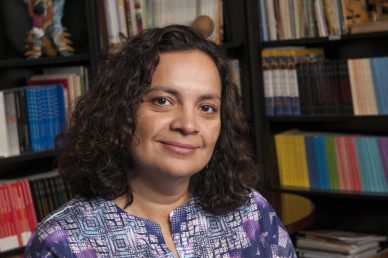UIC to lead new consortium of Hispanic-Serving Institutions
The University of Illinois Chicago will lead a new consortium of 16 Hispanic-Serving Institutions, or HSIs, that have R1 designation — top tier doctoral university with very high research activity — in the Carnegie Classification of Institutions of Higher Education.
The initial launch of the national initiative, which is called “Crossing Latinidades,” is supported by a $150,000 grant from The Andrew W. Mellon Foundation to the department of Latin American and Latino studies and the Office of Diversity at UIC.

The project’s principal investigator, Amalia Pallares, associate chancellor and vice provost for diversity, says pooling the group’s strengths and creating collaborations that combine resources in innovative ways will be an important first step toward ensuring the growth and sustainability of Latino studies and further developing the field in new directions across the humanities.
“The growth of academic and publicly engaged scholarship in Latino studies, which has been the outcome of strong student and faculty advocacy, has been hard-earned, but remains uneven,” said Pallares, who is also professor of Latin American and Latino studies and political science. “In this current pandemic situation, it is more important than ever not to lose the strengths that have been gained but to maintain the vitality of Latino studies and the diversity of staff — especially in the humanities — and to develop creative approaches to sustaining and growing vital interdisciplinary research agendas.”
UIC Chancellor Michael D. Amiridis and María de los Ángeles Torres, UIC professor of Latin American and Latino studies, serve as co-principal investigators for the initiative.

“UIC and our partner universities have similar experiences in that we have a strong commitment to research and house very diverse student populations,” Amiridis said. “I have communicated with the leaders of all partnership institutions, and we share a common vision of working together to address key issues in Latinx education, including the creation of a robust pipeline for new Latinx faculty.”
Over the course of the next 14 months, UIC will organize small and large-scale meetings among scholars from different participating institutions, and hold one meeting of chancellors and presidents of the 16 HSIs to affirm their support towards this effort.
The consortium also will feature four pilot collaborative working groups that will develop proposals of comparative research, scholarship, teaching and resource sharing built around the themes of material culture; language and identity; climate change and inequality, and poetry. Their plans will be submitted for consideration in the next phase of the project.
“At the conclusion of the planning year, we aim to be in a position to launch a call for collaborative research, teaching, public scholarship and shared resource creation proposals that would put the multi-year project, ‘Crossing Latinidades,’ in motion,” Pallares said.
UIC’s institutional partners in the consortium will include the Graduate School and University Center of the City University of New York; University of Arizona; University of California, Irvine; University of California, Riverside; University of California, Santa Barbara; University of California, Santa Cruz; Florida International University; University of Central Florida; University of New Mexico; University of Nevada, Las Vegas; University of North Texas; Texas Tech University; University of Houston; University of Texas, Arlington, and University of Texas, El Paso.
